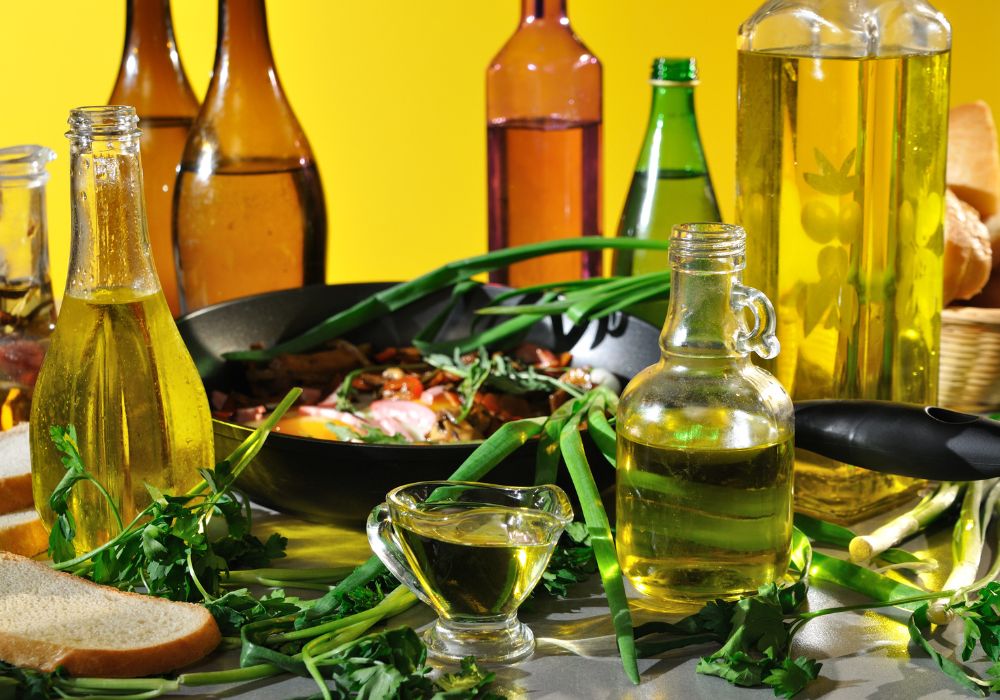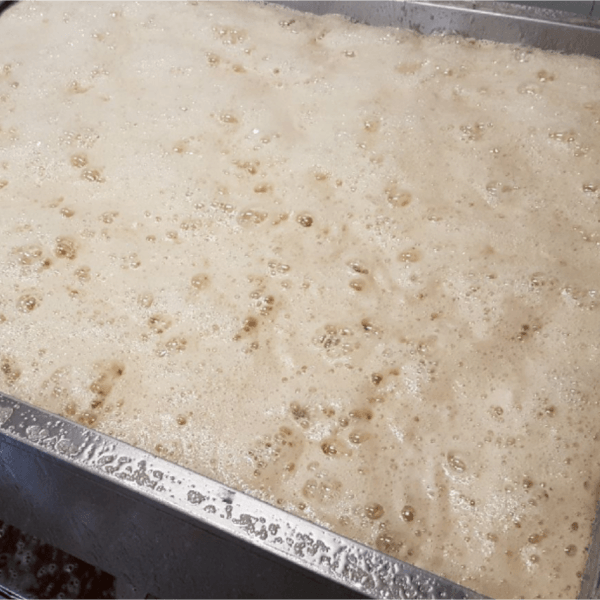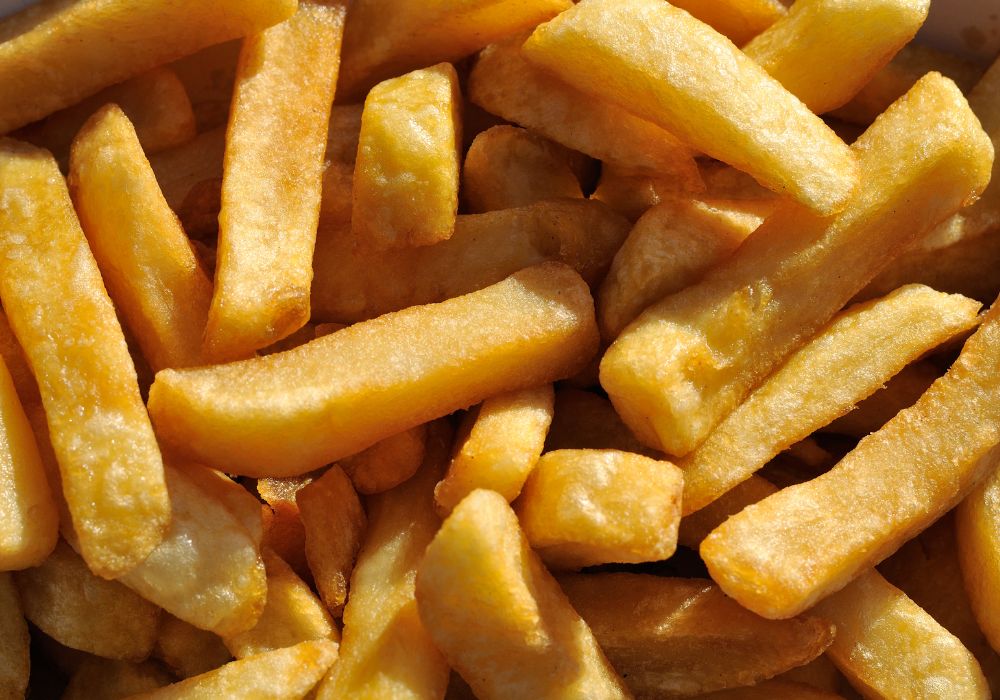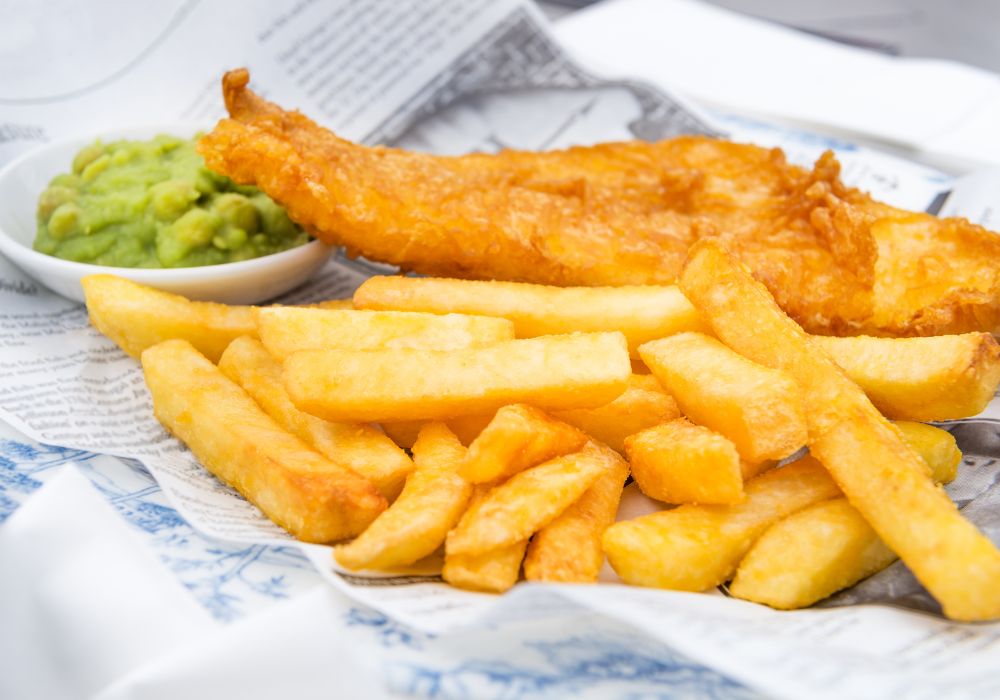Vegetable oil is made from fruits, seeds, grains, and nuts. These include palm oil as well as oil from peanuts, avocados, olives, sunflower seeds, rapeseeds, corn, and soybeans, and they can be pure, or a blended oil. Vegetable oil is the most popular type of oil for frying, both at home and in restaurants, because it is so versatile and creates that perfectly crisp, golden result we all love so much!
Is Palm Oil Vegetable Oil?
Yes! In fact, palm oil is one of the most popular types of vegetable oil. It is made from the reddish pulp of palm tree fruit (not to be confused with palm kernel oil). It has a neutral taste and high smoke point, which makes it a safe and delicious option for shallow and deep frying. Additionally, it’s very popular as a vegan butter alternative for baking too, as it melts in a similar way.
Palm oil is refined into a very pure oil that contains immune-boosting antioxidants like tocopherols (Vitamin E). Finally, it’s also very affordable – although we recommend you spend a little more to get the benefits of sustainably farmed and produced palm oil that is RSPO certified. This means that it is produced by farms that do not contribute to rainforest deforestation, that follow ethical employment processes, and minimise greenhouse gas contributions by not using peat for burning for energy production.
How is Vegetable Oil Made?
The process for making vegetable oil depends on what the oil is being extracted from. Some oils, like olive oil, undergo a very simple process where the olives are pressed to push out the oils, then filtered to remove impurities, and can be used immediately. This is known as extra virgin olive oil. This oil can be further processed to create slightly different versions for different uses.
Other vegetable oils need a more complex process! Generally, this process involves:
- Crushing the seed or fruit to remove the crude (unprocessed) oil.
- Processing the crude oil to produce a product suitable for frying – for example, palm oil is refined and deodorised to a pure, light coloured, taste-and-odour-free product.
- At each stage of the process, the unwanted materials are removed for use in other industries. For example, the remaining pulp from palm oil is often used for animal feeds, and the free fatty acids can be removed to make soap.
Is Vegetable Oil Kosher, Vegan-friendly, and Halal?
Each of these categories has their own set of regulations, and depending on the processes the producer uses, may be kosher, halal, and vegan.
- Kosher and Halal – As long as the equipment used to process the oil isn’t used for processing animal fats, and it is transported without animal fat contamination, the product can meet kosher and halal standards.
- Vegan – Vegetable oils are vegan when they meet the standards for zero-animal ingredients, as well as meeting guidelines for ethical and sustainable farming, processing, packaging, and transportation. This can also assist with meeting stricter kosher and halal standards. Frymax is proud to offer vegan palm oil.
As always, if you have any dietary restrictions or responsibilities, it’s essential to check the supplier themselves as well as the product labelling to see if it is certified to meet those standards. Frymax is proud to be a responsible and sustainable palm oil supplier, offering non-GMO, additive-free palm oil that meets international RSPO standards for vegetable oil.
Cooking with Vegetable Oil
There’s a good reason why restaurants, chippies, and home cooks love vegetable oil – it’s so easy to cook with!
The main considerations when cooking with vegetable oil include checking the frying temperature/smoke point of the oil, and ensuring it is bland or contributing to the taste of your dish.
For example, both peanut oil and palm oil (not palm kernel oil) only start to burn at 235° Celsius (this is known as the smoke point), which makes them ideal for very hot frying like making chips, stir-fries, and deep frying. However, peanut oil has a distinctive taste while palm oil is bland, so the palm oil may be a better option if you don’t want a nutty taste in your food.
Common foods cooked in vegetable oil include:
- Chips
- Fish
- Steak
- Chicken
- Onion rings
- Egg and spring rolls
- Stir fries
- Schnitzels
- Crumbed mushrooms and vegetables
- Roast vegetables
- Samosas
- Doughnuts
- Chilli poppers
- Churros
- Scotch eggs
- Dim sum
- Falafel
- Tempura
What Does Vegetable Oil Taste Like?
The taste of vegetable oil depends on what plants, fruits, or nuts are in the oil as well as how the oil has been processed. It’s good to keep in mind that the flavour and smell of the oil will change the finished result of whatever you cook in it, which can make or break your meal.
Usually, the best option is to choose an oil that has been processed to produce a neutral flavour. This means that the scent and taste of the oil have no impact on the flavour of your dish, simply delivering the crispy fried texture you’re looking for.
At Frymax, our palm oil is not only a sustainable vegetable oil, but also neutral in taste and smell. This means you can fry chips, fish, doughnuts, mince pies, vegetables, and meats without compromising the taste of your dish!
Buy the Best Vegetable Oil From Frymax – the UK’s Leading Palm Oil Supplier
Frymax is the UK’s largest supplier of frying oil to fish and chip shops and other food outlets and restaurants and has been since 1954. And Frymax doesn’t just give you the best results every time you heat up the frying pan, it’s the best choice for sustainability too. Since 2013, Frymax oil has been made from fully-segregated, RSPO-certified palm fruit oil. Not a drop of non-certified oil goes into the production of Frymax. Home cooks and restaurateurs can rest assured that, when they choose Frymax, they are supporting sustainable, ethical palm oil production. For more information don’t hesitate to get in contact with the helpful Frymax team.
Become a Frymax member today to gain access to exclusive content, expert frying advice and the chance to enter our fantastic competitions.






